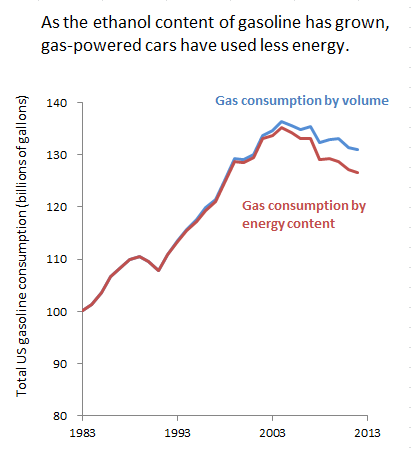There’s been quite a bit in the news of late about the nationwide declines in driving and gasoline consumption. Take, for example, last week’s PIRG/Frontier Group report on what those declines mean for the nation’s transportation finances. The report generated some interesting press coverage.
And there’s also been quite a lot of attention to ethanol—particularly the fact that US ethanol consumption has grown so quickly that refiners are starting to bump against the so-called “blend wall,” the point at which no more ethanol can be added to highway fuel without running into legal and/or technical troubles. (For more on the blend wall, see this Congressional Research Service report.)
But the two issues—declining gas consumption, increasing ethanol consumption—actually interact in interesting ways. Ethanol has about one-third less energy per gallon than gasoline does. Combining the slight declines in the volume of gasoline sold with steady increases in the amount of ethanol in the nation’s gas supply, the energy content of gasoline used on the nation’s roads has shrunk at a surprising clip. Take a look:
As the chart shows, US gasoline consumption peaked in 2004. Measured by volume, gas consumption has fallen modestly since then. But as ethanol in the gasoline supply grew, the energy in the average gallon declined—leading to a steep, 6 and 7 percent decline in the annual energy content of fuels consumed. All told, the energy consumed by cars and trucks has declined almost as steeply as it rose during the latter stages of the driving boom.
The upshot: we’re driving less; we’re driving more efficient vehicles; and we’re using less energy-rich fuels. It’s quite a change! And yet it’s been slow enough that it’s gone virtually unnoticed; and it’s certainly a change that hasn’t yet filtered into how we make decisions about our transportation future.









Jan Steinman
Then there’s the 800-pound gorilla in the room: economic growth cannot happen without energy use growth.
All the politicians and business leaders who are working toward growth are working counter to the trends mentioned above.
We need to develop a culture of non-growth — perhaps even of controlled, purposeful economic shrinkage, or we’ll do ourselves in. As Edward Abbey said, “Growth for growth’s sake is the ideology of the cancer cell.”
Adrienne Adams
The first part of this article contains accurate information; however, the interpretation and subsequent conclusion are entirely flawed.
First off, when we say “energy” we usually mean “power.” Power is the rate at which energy is transferred, used, or transformed; simply put, the ability to do work. Power is measured in joules/second, or energy divided by time. The Btu [British thermal unit] is a unit of heat energy equivalent to about 1055 joules. (A joule is a measure of energy that is required to produce one watt of power for one second.)
We all understand power when we are doing work. At the gym, we realize that it’s harder to do ten reps with a five-pound weight than one rep. We understand it takes more power (“energy”) to walk at 5 mph than 3 mph. It takes more power (“energy”) to run five miles than to walk two. Power = energy divided by time.
What I know of physics boils down to “there ain’t no free lunch.” Ethanol does contain less “energy” (Btu per gallon) than gasoline, true. Gasoline contains approximately 119,000 Btu per gallon and pure ethanol 76,000 Btu per gallon. Gas with ethanol (E-10) contains 10% ethanol per volume, so E-10 contains about 114,700 Btu per gallon, for a difference of ~4300 Btu per gallon. Divide 4300 by 119,000 and you get 3.6%. So E-10 fuel has approximately 3.6% less energy units (Btu) per gallon than conventional gasoline. (Ethanol is a higher octane fuel, and high-performance engines burning 85% ethanol the higher octane rating can increase combustion efficiency; but the effect in E-10 is negligible.)
So our basic E-10 ethanol contains around 3.6% fewer units of energy than conventional gasoline. In order to do the same amount of work, a car engine must consume about 3.6% more E-10 than pure gasoline. There is no magic that will enable an engine to perform the same amount of work with less energy. The conclusion that “gas consumption by energy content” is somehow different from overall gas consumption is simply false.
This confusion between “energy” and “power” is extremely common, and is a typical reason that most laypeople understand energy issues so poorly. However, I think it is extremely important for journalists discussing energy issues to get this information right.
Clark Williams-Derry
As the author, I disagree that the conclusion is flawed. I believe you are simply confused.
First: when I say energy, I do mean energy. Not power, but energy.
Second: You say “There is no magic that will enable an engine to perform the same amount of work with less energy.” This is false. The “magic” is simple efficiency, often expressed as MPG. Just to be clear what I’m saying here: two cars of equal mass and equal speed WILL have the same kinetic energy, by definition. The same amount of work (energy * distance) will have been applied to both. But the car engines may have consumed very different amounts of chemical energy in the process of attaining that kinetic energy. Different vehicles have very different conversion efficiencies. That’s why cars have different MPG — some are simply better at converting chemical energy into forward motion, and minimizing the amount of chemical energy and/or kinetic energy that is simply wasted as heat.
As I’m sure you know, in most cars only a small share of the chemical energy in fuel is converted into forward motion. Estimates I’ve seen, including this one suggest that about 85% of the chemical energy of gasoline that fuels a car is simply wasted as heat. So reducing that waste by even a few percentage points can have fairly big impacts on the gasoline energy consumed in order to achieve a certain amount of kinetic energy.
Third: My point, which you say is “flawed”, is essentially the same point you make in the first sentence of your penultimate paragraph.
I’ll try to restate the point:
* Gasoline consumption statistics are typically expressed in volume, not energy equivalents.
* Measured by volume, gasoline consumption peaked in 2004, and declined slightly thereafter. When people talk about the “peak” in gasoline consumption, this is usually what people talk about.
* At the same time, the share of ethanol in the gasoline supply increased from about 2-3% to nearly 10%. Because of the gains in ethanol in the fuel supply, and the fact that ethanol has less energy per unit volume than gasoline, the total energy content of the gasoline consumed by cars each year declined even faster than the volume of gasoline.
The implications are: through a combination of improved fuel economy and less driving, the nation’s cars and trucks are using substantially less energy than they did in 2004.
Dave Danielson
Excellent. Well stated.
Adrienne Adams
Ah, I see. The article is not about energy consumption at all. It is simply an observation that gasoline mixed with ethanol has a lower energy content. Less energy content = less energy available to do work. So we are consuming a lower-grade fuel (fewer Btu per gallon) with E-10 than with conventional gasoline.
The ethanol industry claims that E-10 affects on MPG are “minimal,” however anecdotal reports from drivers say that it is indeed measurable. I think the title and conclusion of this article are misleading, as a reader might assume that you were saying that higher ethanol consumption means we are using less energy in total, due to higher consumption of E-10 fuel. Now I see that you are saying nothing of the sort.
Are you saying that ethanol creates more chemical energy than gasoline at the same volume? That burning ethanol “wastes” less fuel? If so, please provide sources as I am not aware that conventional engines designed to burn 100% gasoline burn E-10 more efficiently than pure gasoline.
No argument there. But neither of those things have anything to do with ethanol.
Clark Williams-Derry
I think I see your point now.
You’re right, we’re not using less energy BECAUSE we’re using ethanol. Substituting one BTU of ethanol for one BTU of gasoline does nothing to reduce (or increase) energy consumption by cars and trucks.
It’s just that the nation’s cars and trucks are using less energy than one might think, if one only looked at trends in the VOLUME of fuel consumed. Based on volume alone, declines have been modest. Based on energy content, declines have been somewhat steeper.
This is not a defense of ethanol, or a claim that ethanol is somehow better or more efficient than gasoline. It’s simply a description of the trends in vehicle ENERGY consumption, as distinguished from the VOLUME of highway fuels consumed. The fuel volume is what’s typically discussed in transportation debates, but energy is, in my opinion, a better way of looking at the trends.
About your other questions: no, I’m not making those claims. I don’t see why you think that I am.
Clark Williams-Derry
But I should add:
Yes, the article IS about energy consumption. It’s an observation that, because today’s gasoline has more ethanol, on average, than the gasoline sold in 2004, the energy consumed by cars and light trucks has fallen faster than the volume of fuel consumed has.
I believe that you think that the title and conclusion are misleading because you are confused, and for some reason want to believe that I’m arguing something that I am not.
Adrienne Adams
Yes, I see it now. As they say, “explain it to me like I’m a box of rocks,” which is what I certainly am. Ethanol is in effectmasking the total energy use when we describe gasoline consumption strictly in terms of gallons burned, or volume, as opposed to the energy density of the fuel.
I was consistently thrown by the phrases “…gas-powered cars used less energy,” and “Energy use in cars and trucks is declining…” which I incorrectly interpreted to mean individual vehicles, not gas-burning vehicles as a whole.
My apologies for being so thick.
Clark Williams-Derry
No problem!!